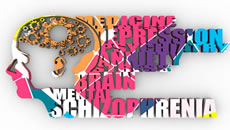
Schizophrenia
More than two million people in the United States suffer from Schizophrenia. It is most common for men in their late teens to early twenties and for women in their early to mid-twenties. It occurs even more rarely after the age of 40, but onset to the disease can occur at any age.
Schizophrenia is a serious (and treatable) mental health disorder that interferes with a person’s ability to think in an organized and logical manner. People suffering from Schizophrenia have trouble thinking clearly, managing emotions, making decisions, and relating to others. Most people also experience hallucinations and delusions. A lack of knowledge and education on the illness can cause many people to fear and misunderstand the disorder. Although the disease can cause unusual, inappropriate, or unpredictable behavior, people with Schizophrenia are not dangerous if they are receiving treatment. Without treatment, violence can be a risk because they are not receiving the appropriate medication and guidance.
It remains unknown as to the cause of the disease, but it is thought to be a combination of genetics and development. It also has been found that sometimes stressful life events or substance abuse can trigger onset for someone who is already predisposed to the illness. Research believes the cause relates to brain structure and chemistry. But, with the right help and medications, many individuals with Schizophrenia can manage to live an independent and fulfilling life – even with this chronic condition.
What are the symptoms?
- Psychotic Symptoms – Hearing voices or seeing things that don’t exist or believing ideas that are obviously false.
- Negative Symptoms – Lacking expressiveness or lack pleasure or interest in life.
- Cognitive Symptoms – Problems with task priority, memory retention, and thought organization.
Before seeking for treatment, it is key to receive an accurate diagnosis from a qualified professional. Especially because other illnesses with overlapping symptoms must be ruled out before moving forward.
How do you treat Schizophrenia?
- Psychotherapy – Helps develop learning strategies for living, working, and relationships.
- Medication – Helps relieve hallucinations and delusions.
What can you do right now?
- Get educated. Develop a deep understanding of the disorder. Be an expert and know what effective medications and therapies are out there.
- Get treatment. Untreated individuals with Schizophrenia are at risk for poverty, homelessness, and suicide.
- Be supportive and willing to listen. Do not argue or act afraid. Instead, ask what you can do to help them feel safer and in control.
- Connect with other families. Learn how to become a partner in the process of recovery. Learn from other families’ and their experiences.
- Find the right therapist. Ask how much experience they have with clients who suffer from Schizophrenia.
Recovery is possible for most individuals with Schizophrenia. If you have a loved one who suffers from this disorder, therapy can also help you cope with the situation. Marriage and Family Therapists (MFTs) are experts at relationships. They work with all individuals, regardless of age to help support patients in life’s challenges. Visit CounselingCalifornia.com to gain access to an online directory of licensed MFTs in your area.
Find a Therapist
Back